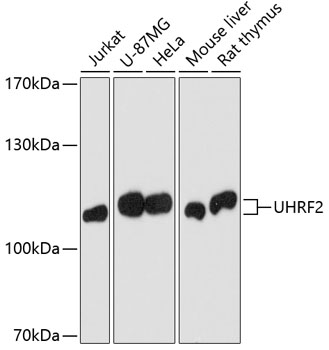Cell Biology Antibodies 16
Anti-Uhrf2 Antibody (CAB2344)
- SKU:
- CAB2344
- Product Type:
- Antibody
- Reactivity:
- Human
- Reactivity:
- Mouse
- Reactivity:
- Rat
- Host Species:
- Rabbit
- Isotype:
- IgG
- Research Area:
- Cell Biology
Description
| Antibody Name: | Anti-Uhrf2 Antibody |
| Antibody SKU: | CAB2344 |
| Antibody Size: | 20uL, 50uL, 100uL |
| Application: | WB |
| Reactivity: | Human, Mouse, Rat |
| Host Species: | Rabbit |
| Immunogen: | Recombinant fusion protein containing a sequence corresponding to amino acids 76-359 of mouse Uhrf2 (NP_659122.2). |
| Application: | WB |
| Recommended Dilution: | WB 1:500 - 1:2000 |
| Reactivity: | Human, Mouse, Rat |
| Positive Samples: | Jurkat, U-87MG, HeLa, Mouse liver, Rat thymus |
| Immunogen: | Recombinant fusion protein containing a sequence corresponding to amino acids 76-359 of mouse Uhrf2 (NP_659122.2). |
| Purification Method: | Affinity purification |
| Storage Buffer: | Store at -20'C. Avoid freeze / thaw cycles. Buffer: PBS with 0.02% sodium azide, 50% glycerol, pH7.3. |
| Isotype: | IgG |
| Sequence: | DSSL PSTS KQND AQVK PSSH NPPK VKKT ARGG SSSQ PSTS ARTC LIDP GFGL YKVN ELVD ARDV GLGA WFEA HIHS VTRA SDGH SRGK TPLK NGSS YKRT NGNV NHNS KENT NKLD NVPS TSNS DSVA ADED VIYH IEYD EYPE SGIL EMNV KDLR PRAR TILK WNEL NVGD VVMV NYNV ENPG KRGF WYDA EITT LKTI SRTK KEVR VKVF LGGS EGTL NDCR VMSV DEIF KIEK PGAH PISF ADGK FLRK NDPE CDLC GGDP DKTC HMCS CHKC GEKR DPNM |
| Gene ID: | 109113 |
| Uniprot: | |
| Cellular Location: | Nucleus |
| Calculated MW: | 56kDa/89kDa |
| Observed MW: | 110kDa |
| Synonyms: | UHRF2, NIRF, RNF107, TDRD23, URF2, Uhrf2 |
| Background: | This gene encodes a nuclear protein which is involved in cell-cycle regulation. The encoded protein is a ubiquitin-ligase capable of ubiquinating PCNP (PEST-containing nuclear protein), and together they may play a role in tumorigenesis. The encoded protein contains an NIRF_N domain, a PHD finger, a set- and ring-associated (SRA) domain, and a RING finger domain and several of these domains have been shown to be essential for the regulation of cell proliferation. This protein may also have a role in intranuclear degradation of polyglutamine aggregates. Alternative splicing results in multiple transcript variants some of which are non-protein coding. |







